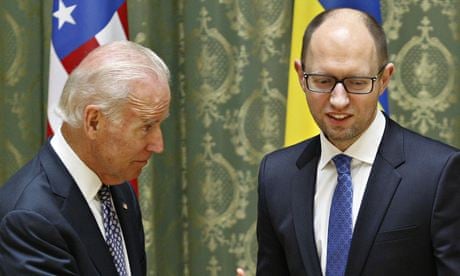Russia issued a blunt warning on Wednesday that it would respond if its interests were attacked in Ukraine, as pro-Kremlin rebels in the east of the country braced for a new military offensive by Kiev.
The threat by the Russian foreign minister, Sergei Lavrov, in which he recalled the 2008 war with Georgia over breakaway South Ossetia, came as Russia accused Kiev and the US of distorting an agreement reached in Geneva last week to defuse the crisis and of ignoring what it said were provocative actions by Ukrainian nationalists.
Lavrov used an interview with the Russian state-controlled broadcaster RT to accuse the US of "running the show" in Ukraine, claiming that it was "quite telling" that Kiev had announced a new offensive in the east of the country after US Vice-President Joe Biden had visited.
"If we are attacked, we would certainly respond," Lavrov told RT.
"If our interests, our legitimate interests, the interests of Russians have been attacked directly, like they were in South Ossetia for example, I do not see any other way but to respond in accordance with international law."
The Russian foreign ministry said in a statement that it believed the west was serious about seeking peace in Ukraine but "the facts speak of the opposite".
Moscow also announced a seven-day naval exercise in the Caspian Sea and began military exercises in its Rostov region, bordering Ukraine. The US on Tuesday announced military exercises in Poland.
The crisis deepened on Tuesday after Biden's departure from Kiev following a two-day visit. In a late-night phone call, the US secretary of state, John Kerry, told Lavrov, of his "deep concern over the lack of positive Russian steps to de-escalate" the crisis in eastern Ukraine, a state department official said.
The Kiev government and its western supporters accuse Moscow of using covert agents to foment unrest in eastern Ukraine. Moscow denies that, and says people in the east rose up spontaneously against a government in Kiev which, it says, is illegitimate and aligned with far-right nationalists.
Russia says Kiev's new leaders – whom it regards as illegitimate – are to blame for the collapse of the peace accord brokered in Geneva.
Moscow maintains the accord was ruptured by ultranationalists who killed rebels in an attack on Sunday near the eastern town of Slavyansk.
The leader of the ultranationalists blamed by rebels for that attack, Dmitry Yarosh of the Right Sector militia, said on Wednesday he would suspend his presidential campaign to create an 800-man "Donbass battalion" to assist government forces to take back eastern Ukraine.
"Bandera's army has finally crossed the Dnieper River," Yarosh said at a press conference in the eastern city of Dnepropetrovsk, referring to the 20th-century nationalist leader Stepan Bandera, who is despised by many in the east as a Nazi collaborator.
Donbass, the historic coal-mining region centered on Donetsk in eastern Ukraine, "faces the same fate as Crimea," he said, blaming Russian agents for the government building takeovers. Right Sector "will be a stabilising factor," he said.
Lavrov cited Sunday's shootout in Slavyansk as evidence that Kiev was not fulfilling the conditions of the Geneva agreement to disarm militia forces in Ukraine. Yarosh called this version of events "Kremlin propaganda."
Ukraine relaunched military operations against pro-Kremlin separatists late on Tuesday.
Ukraine's acting president, Oleksandr Turchynov, said he was ordering the military to restart operations after the discovery of two "brutally tortured" bodies in Slavyansk.
One of them, he said, was that of a recently kidnapped local councillor from a nearby town who belonged to his party.
The US defence department at the same time announced it was sending 600 troops to neighbouring Poland and to Baltic countries for "exercises".
Russia's defence ministry announced on Wednesday that the navy had launched snap military exercises involving its fleet in the Caspian Sea.
The drill will last seven days and involve around 10 naval vessels and 400 crew. The Caspian Sea is bordered by Iran, Russia, Kazakhstan, Turkmenistan and Azerbaijan – a region that is crisscrossed by oil and natural gas pipelines.
The latest moves underscored the severity of the crisis that has brought east-west relations to their most perilous point since the end of the cold war.
In a further slide back towards violence, which many fear could tip into civil war, a Ukrainian reconnaissance plane was hit by gunfire while flying above Slavyansk.
The Antonov An-30 propellor-driven plane received several bullet impacts, but safely made an emergency landing and none of its crew members was hurt, said the defence ministry in Kiev.
